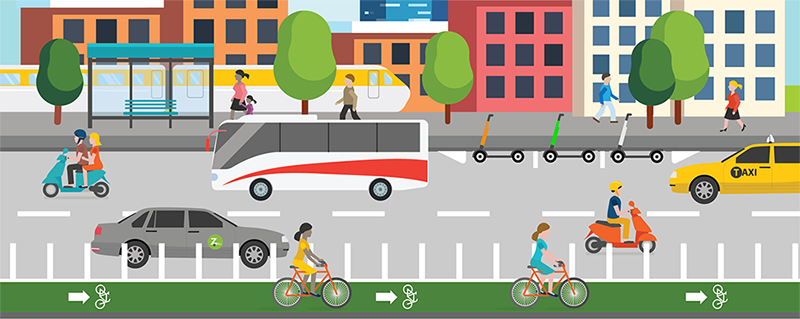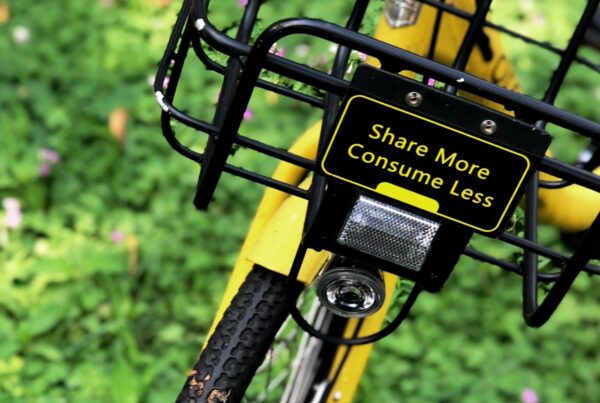Welcome to the Shared-Use Mobility Center’s weekly guide to the most impactful news, thought-provoking articles and innovative technologies that are shaping our transportation future. We believe in sharing information, just like sharing cars, bikes, and scooters, so if there’s anything additional you’d like to see, just drop us a line.
SUMC News and Announcements
Noon – 1:30pm EST | 11:00am – 12:30pm CST | 9:00 am – 10:30am PST
 The Mobility Hubs to Connect Communities webinar is the first in SUMC’s Path to the Shared Mobility Summit series.
The Mobility Hubs to Connect Communities webinar is the first in SUMC’s Path to the Shared Mobility Summit series.

Danielle Kochman
Mobility Planning Manager
San Diego Association of Governments (SANDAG)

Jasna Hadzic-Stanek
Transportation Planner
City of Minneapolis

Joy Massey
Program Manager
TransForm

Rebecca Karbaumer
Sustainable Mobility Project Coordinator
City of Bremen, Germany

Sharon Feigon
Founder and Executive Director
Shared-Use Mobility Center

Alvaro Villagran
Program Manager
Shared-Use Mobility Center
25 Projects in 17 states to receive $8.5 million in HOPE Grant funding
The Federal Transit Administration’s Helping Obtain Prosperity for Everyone (HOPE) Program supports projects that will improve transit services or facilities in areas of persistent poverty through planning, engineering, or development of technical, or financing plans for projects. On October 7, 2020, FTA announced the 25 grant recipients. Our congratulations to all!
See awardees and read about their projects
Fill up your calendar with Federal Transit Administration events
Stay in the know and connect with colleagues at roundtables, webinars, workshops, and more. View the calendar.
Mobility Justice
The privatization of public infrastructure, defined as the “full range of goods, services, and investments needed for communities to thrive,” creates unjust access to unequal resources for historically Black and brown communities, while investing in public infrastructure supports the social and economic good of all.
Read how the Englewood Development Group in Chicago is taking charge to fix development woes, which have plagued the city’s South and West Sides due to decades of redlining and credit discrimination, by building community-oriented housing initiatives with local leaders—from the ground up.
As the effects of climate change continually hit marginalized areas the hardest in the US, Bklyner calls for cities like New York to push a Green New Deal now to end the high-risk, health-related conditions in these predominantly POC communities.
What does public space mean to Chicago residents and how have parks created a living, growing timeline of community values? Next City acknowledges the importance of reflecting on social changes in history that affect our connection to public spaces and what that means for the “communities who collectively own them today.”
Ridehailing/Carsharing/Carpooling
Ridehailing player Lyft and electronic health record firm Epic have teamed up to give healthcare staff in thousands of hospitals and health systems across the US the option to order a Lyft ride for patients directly from their e-record.
A new ridehailing startup operating in Southeast Michigan called Zoom Ride believes it can build a safer rider and driver community through unique features such as motion-activated ultraviolet lights that sanitize between rides and female-oriented options, including the ability to request female drivers, share trip information, and utilize an in-app panic button.
Kenya gets its first peer-to-peer carsharing platform from startup Komboa in Nairobi with plans to expand across the country.
Read AARP’s latest report on the challenges that insurance agencies face when distinguishing volunteer ridehail drivers from paid drivers and how that changes when factoring in insurance rates and commercial policies.
Bikesharing and Micromobility
Take two wheels to the polls this election season with the North American Bikeshare Association’s new “Roll to the Polls” campaign that helps voters ride to voting sites via free or discounted micromobility trips, with partners including Bird, Boulder Bike Sharing, Gotcha, Lime, Detroit’s MoGo, and many more.
Starting this winter, users with the Lime app can access nearby sit-down scooter options from competitor Wheels in Austin, Berlin, Miami and Seattle as the bright-green mobility company opens up its platform to more micromobility options.
“We must forget the crossing of Paris from east to west by car,” says Paris Mayor Ann Hidalgo in an interview with French newspaper Le Parisien while discussing the move to make the capital metro a bike haven with permanent curb-protected cycleways and temporary bike lanes for a cleaner ville de Paris.
Determined to create an intercity network of paths and trails for cyclists and pedestrians across the US, projects like the East Coast Greenway and Great American Rail-Trail want to connect communities using safe infrastructure that allows for healthy, emissions-free access to everyday amenities—and greenway stimulus funds have gained bipartisan support.
Transit
As reported by the New York Times, a draft order created by the Centers for Disease Control and Prevention would have required “all passengers and employees to wear masks on all forms of public and commercial transportation” in the US—but was blocked by the White House Coronavirus Task Force.
Birmingham, UK will be launching its Clean Air Hydrogen Bus Pilot with 20 hydrogen fuel-cell double-decker buses, a first in the world, in 2021 to spearhead a zero-emissions future to help decarbonize public transportation and improve air quality in the area.
Getting around in rural Delaware can be a rough experience for those with limited mobility or for lower-income residents with limited means, but the Delaware Transit Corporation’s new project through the FTA’s Accelerating Innovative Mobility program plans to use microtransit solutions to fill those transportation gaps for better job connectivity.
Metra in Chicago has announced its proposed $700 million operating budget for 2021, which includes $386.4 million in capital spending for locomotive and railcar rehabilitation, bridge infrastructure replacement, station upgrades (including ADA accessibility improvements), and equipment/vehicles.
Technology
Meet Amazon’s first all-electric delivery van, built by EV startup Rivian, which features the latest sensing, driver-assist tech, and Amazon’s Alexa integration. The company’s goal is to have 10,000 of these EVs delivering goods “as early as 2022″ with a whopping total of 100,000 on the streets by 2030.
According to GeekWire, the University of Washington’s Urban Freight Lab is betting on dedicated storage lockers for deliveries and commercial loading zones with in-pavement vehicle sensors to fix common urban delivery issues and reduce the time spent driving around for drivers.
Swedish self-driving freight startup Einride has revealed a new customizable autonomous and electric delivery truck that features no steering wheels, pedals, windshields, or passenger cab and uses Nvidia’s self-driving software to achieve Level 4 autonomy.
Hail a taxi, without the driver. If you’re a Waymo One customer in the Chandler, Arizona area (a suburb of Phoenix) you can, as the company takes the slow roll-approach to its driverless taxi service, with plans to open up to the public in coming weeks.
Sustainability
Transportation for America’s latest report outlines how the largest source of CO2 emissions in the US—around 83%—come from cars and freight trucks and details the much needed land-use strategies that can be implemented at the federal, regional, and municipal level to restructure communities around walking, biking, and taking transit to local amenities.
What happens when the infrastructure built years ago for our cities isn’t prepared for the ever-transforming environment due to climate change? Vice shares a deep dive into the ways current roads, bridges, tunnels, and water infrastructure in the US don’t address present-day climate struggles, such as severe water flow and temperature fluctuations.
Mobility Lab makes the case for auto companies to pump the brakes on car-boasting advertising that negatively shapes public opinion of transit services and promotes a car-centric transportation system—and all of the societal, economic, and public health consequences that come with it.
California’s Clean Cars 4 All wants to get people out of gas-guzzling cars and into electric vehicles with a trade-in program for their old wheels that offers options for the vehicle to be exchanged for transit passes, carsharing vouchers, and e-bike rebates.
Requests for Proposals, Inquiries, and Information
NOFO: Public Transportation COVID-19 Research Demonstration Grant Program
Federal Transit Administration
Deadline: November 2, 2020
RFP: Three Health Care Shuttles for Salem County Senior Residents and Limited Disabled Residents, and General Population in a Rural Area
Salem County
Salem, New Jersey
Deadline: November 5, 2020
NEW RFP: $200 Million For Renewable Energy Supplier for All City-Owned Buildings
City of Chicago
Chicago, IL
Deadline: November 6, 2020
RFI: RideShare Software
Des Moines Area Regional Transit Authority
Des Moines, Iowa
Deadline: November 9, 2020
Did someone forward this to you? Sign up for our newsletter here.




